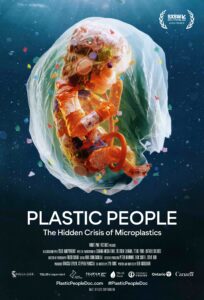In Vancouver, BC Tune in every Wednesday 6 – 7 PM to CFRO – 100.5 FM
Anywhere in the world by Stream, Satellite, TelusTv - How to Listen
Only last 10 shows are available to listen to for free - REGISTER NOW. Supporting Members have unlimited access to this and hundreds of other life changing programs - Click Here to sign-up
Join Marc Caron as he speaks with Ziya Tong about her most recent documentary “Plastic People”. ZIYA TONG is an award-winning author and broadcaster, best known for her work with Discovery’s flagship science show, Daily Planet, and NOVA ScienceNow on PBS. She is the author of the best-selling book The Reality Bubble, which was shortlisted for Canada’s most prestigious non-fiction literary prize, and won the Lane Anderson Award for best science writing. Ziya served as the Vice Chair of WWF Canada and currently serves as a trustee of WWF International.
 The ground-breaking feature documentary PLASTIC PEOPLE investigates our addiction to plastic and the growing threat of microplastics on human health. Almost every bit of plastic ever made breaks down into “microplastics.” These microscopic particles drift in the air, float in all bodies of water, and mix into the soil, becoming a permanent part of the environment. Now, leading scientists are finding these particles in our bodies: organs, blood, brain tissue, and even the placentas of new mothers. What is the impact of these invisible invaders on our health? And can anything be done about it? Acclaimed author and science journalist Ziya Tong takes a personal approach by visiting leading scientists around the world and undergoing experiments in her home, on her food, and her body while collaborating with award-winning director Ben Addelman (Discordia, Bombay Calling, Nollywood Babylon, Kivalina v. Exxon) in an urgent call to action for all of us to rethink our relationship with plastic. https://plasticpeopledoc.com/
The ground-breaking feature documentary PLASTIC PEOPLE investigates our addiction to plastic and the growing threat of microplastics on human health. Almost every bit of plastic ever made breaks down into “microplastics.” These microscopic particles drift in the air, float in all bodies of water, and mix into the soil, becoming a permanent part of the environment. Now, leading scientists are finding these particles in our bodies: organs, blood, brain tissue, and even the placentas of new mothers. What is the impact of these invisible invaders on our health? And can anything be done about it? Acclaimed author and science journalist Ziya Tong takes a personal approach by visiting leading scientists around the world and undergoing experiments in her home, on her food, and her body while collaborating with award-winning director Ben Addelman (Discordia, Bombay Calling, Nollywood Babylon, Kivalina v. Exxon) in an urgent call to action for all of us to rethink our relationship with plastic. https://plasticpeopledoc.com/
Watch the Interview here:
In Ziya’s words…
“We are fast becoming a plastic society. Pretty soon, we will have more in common with Ken & Barbie than with our natural environment.” — Anthony T. Hincks
We live in a time where some of our greatest threats are invisible. Like the climate crisis, microplastic pollution cannot be: it spans the globe, chokes up rivers and animals, and insidiously infiltrates the human body.
infiltrates the human body.
As a science journalist and author, I have been reporting on the threat of plastic for almost two decades and believe that now more than ever, we need to reveal the connection between planetary health and human health, which is why I’ve put my own body on the line for the “Plastic People” project.
As part of my journey, I will test my own home, my own food, and even my own feces for microplastics. We are very fortunate to also have a world-first for this project, as we meet surgeons and scientists who are probing the human brain to reveal whether microplastics can cross the blood-brain barrier. The results of testing here will be incredibly significant.
Many people have heard of the enormity of microplastic pollution in the environment, but few know the depths of the worrisome science pointing to the fact that plastic accumulation in human bodies is causing serious health concerns. And while we may come across the occasional news headline, there is something viscerally different about actually seeing plastic fragments in human blood, right on the big screen.
In this film, our goal has been to do just that: make the invisible, visible. Tying the human body to the global body, we travel the world to expose the threat of waste colonialism. We hear stories from those on the front lines of the plastic pollution crisis whose bodies are inundated with microplastics on a daily basis. And we see how plastic breaks down in the natural environment: how it spreads on farm fields, enters water systems, and drifts across currents in the air, as we breathe, eat and drink it into our bodies, again and again.
Importantly, however, “Plastic People” is not a paralyzing film. It’s an ambitious attempt to grapple with plastic’s threat to human health in a hard-hitting, but ultimately solutions-oriented way. Yes, the subject matter is weighty. But the goal here is to motivate people to action, not to fear. Accompanying the film will be a state-of-the-art impact campaign to allow viewers, armed with new information, to push for solutions.
It’s strange: I have traveled to the most remote corners of the globe for my journalism. But it is “Plastic People”, the journey to discover the pollution that is closest to home — that’s inside of me — that is possibly the most consequential story I’ve ever told. On behalf of the whole team, thank you in advance for considering this vital and timely documentary. We would be grateful and honored to share it with your audience.
Ben Addelman – Director – Bio & Statement
BEN ADDELMAN makes documentary films, television, and commercials. He is the director of four award-winning feature documentaries. These films have all screened in competition at major festivals including Sundance, Hot Docs, Edinburgh, Human Rights Watch NYC, Durban, Whistler and many more. His work has been broadcast on Apple TV+, Disney+, Netflix, BBC, Viceland, CBC, Sundance Channel, National Geographic, and others.
Having spent almost 20 years making documentary films and television, I believe in the power of this ever-changing medium to open people’s minds and see the world through a different lens. Most often this is a subtle, incremental process that accumulates over time. But occasionally a documentary can take on a subject that is so shockingly urgent that these shifts in point of view happen all at once. The subject of microplastics has the potential to be one of those subjects. We are endeavoring to create a film that rises to the level of the subject matter and has a profound effect on the audience and society at large.
Of course, there are dangers to having this type of lofty ambition. Films with big social messages can be boring, poorly made, partisan and result in the opposite of the desired effect. That is why the team behind Plastic People is committed to making an entertaining film with real character, drama, excitement and depth.
The film is structured as one person’s journey to uncover the depths of the microplastic issue and specifically how this form of pollution impacts human health. This is a global subject, and we will use this opportunity to move around the world with a sense of adventure and investigative spirit. The (preventable) spread of microplastics, and their impact on human health, is a nascent subject that still possesses the power to surprise, shock and infuriate. This tension and drama will be woven into the serious message of Plastic People to achieve the best of both worlds.
From the moment we began discussing this project I was very impressed with every member of the team’s commitment to making something distinctive and meaningful. I have never worked on a project with so much attention paid to that unique combination of creating a social impact and making something big and entertaining right from day one.
I very much look forward to using everything I have learned about filmmaking, structure, creating elevated visuals and storytelling to help bring out the best of this important subject, using this film to educate, to connect and to inspire action on a critically important subject.

You must be logged in to post a comment Login